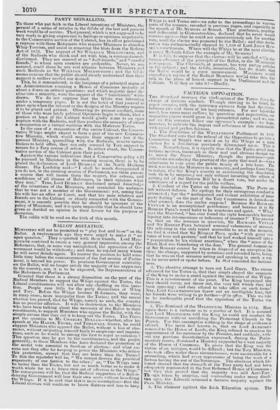BALLOT AGITATION.
MINISTERS will not be permitted to" play fast and loose" on the Ballot. A twelvemonth ago they were urged to make it " an open question." They coquetted with their friends. Lord MEL- BOURNE contrived to create a very general impression among the Reformers, that, in some way unexplained, the opposition of Go- vernment would be withdrawn ; and thus he cajoled many whom be will never delude again. To recover the position he held some little time before the commencement of the last session of Parlia- ment, is beyond his power. To proclaim Government neutrality on the Ballot, will no longer satisfy the majority of his suppen tors in the country, nor, it is to be expected, the Representatives of the Reformers in Parliament.
Granted that there is a strong disposition on the part of the Radical Members to support the Whigs against the Tories, the Liberal constituencies will not allow any shuttling on this ques- tion. People care little for the party distinctions of Whig and Tory. Before the Whigs became Reformers, they were, in many cases, more unpopular than the Tories; and the recent election has proved, that for Whigs, merely as such, the country has no peculiar affection. It will be destruction to the Members who have been talking about the necessity of the Ballot to their constituents, to support Ministers who oppose the Ballot, with the simple excuse that they did it to keep out the Tories. The Times put the question to Mr. CHARLES BULLER—whether, after his speech at the HARDY, Tomos, and THELWALL dinner, he could support Ministers who opposed the Ballot, without a loss of cha- racter, without subjecting himself fairly to suspicions and imputa- tions, such as he would be among the first to repel as calumny ? This question may be put by the constituencies, and the people generally, to those Members who have declared the protection of the secret vote essential to freedom of election : awl what ex- cuse can they offer for keeping in power the Ministers who refuse this protection, except that they are better than the Tories? To this the rejoinder will be, " We cannot discern the practical superiority of one faction to the other ;" or, "The Whigs may be better than the Tories, but not so much better as to make It worth while for us to brave ruin out of affection to the W higs." The consequence will be, that the Radical supporters of a Ballot- denying Government will lose their own seats without benefiting the W hips. If it be said that this is mere assumption— that the Liberal electors will conthlue to brave distress and loss to keep Whigs in and Tories out—we refer to the proceedings in various parts of the country, recorded in previous Pages, and especially to the speech of Mr. Svsloas at Stroud. That gentleman, popular and influential in Gloucestershire, declared that he never would canvass again—that he could not conscientiously ask for another vote, until the elector was protected by the Ballot : and this decla- ration was enthusiastically cheered by 1,500 of Lord JOHN Rus- SEe's constituents. Where will the Whigs be at the next election if many Radicals follow the example of Mr. Svstosts?
It is ailly to suppose that the electors will be satisfied wis'rt the barren ailvecacY of the principle of th i e Ballot, n the Misosteriat newspapers. The Chronicle, at present, has very pre,ty articles on the subject ; and the Globe, occasionally, has no, doubt that the Ballot would be a great improvement. Ministers would exceedingly rejoice if the Radical Members wood take this fine talk in the place of honest support in the .1:earliament awl the Cabinet. Will they so take it?—Hardly.


























 Previous page
Previous page